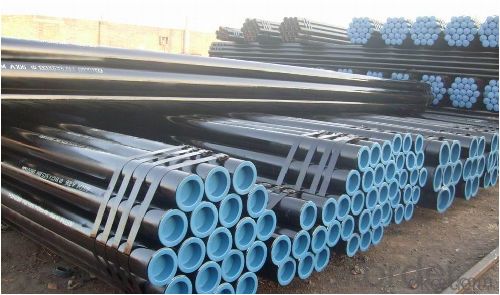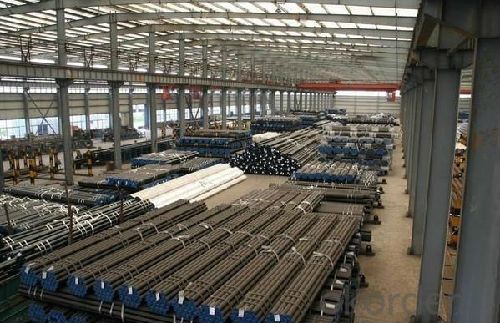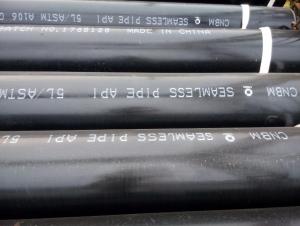API 5L Carton Seamless Pipe For Oling And Gas Application
- Loading Port:
- China Main Port
- Payment Terms:
- TT or LC
- Min Order Qty:
- 25 m.t.
- Supply Capability:
- 10000 m.t./month
OKorder Service Pledge
OKorder Financial Service
You Might Also Like
Product Description:
1、API 5L Carton Seamless Pipe For Oling And Gas Application Description:
Seamless pipe is formed by drawing a solid billet over a piercing rod to create the hollow shell. As the manufacturing process does not include any welding, seamless pipes are perceived to be stronger and more reliable. Historically seamless pipe was regarded as withstanding pressure better than other types, and was often more easily available than welded pipe.
2、Main Features of API 5L Carton Seamless Pipe For Oling And Gas Application:
• High manufacturing accuracy
• High strength
• Small inertia resistance
• Strong heat dissipation ability
• Good visual effect
• Reasonable price
3、API 5L Carton Seamless Pipe For Oling And Gas Application Images:


Packaging & Delivery
Packaging Details: | seaworthy package,bundles wrapped with strong steel strip |
Delivery Detail: | 15-30days after received 30%TT |
4、API 5L Carton Seamless Pipe For Oling And Gas Application Specification:
Standard | GB, DIN, ASTM |
Grade | 10#-45#, 16Mn |
Thickness | 8 - 33 mm |
Section Shape | Round |
Outer Diameter | 133 - 219 mm |
Place of Origin | Shandong, China (Mainland) |
Secondary Or Not | Non-secondary |
Application | Hydraulic Pipe |
Technique | Cold Drawn |
Certification | API |
Surface Treatment | factory state or painted black |
Special Pipe | API Pipe |
Alloy Or Not | Non-alloy |
Length | 5-12M |
Outer Diameter | 21.3-610mm |
Grade | 20#, 45#, Q345, API J55, API K55, API L80, API N80, API P110, A53B |
Standard | ASME, ASTM |
1.Material:20#(ASTM A 106/A53 GRB.API5LGRB,GB),45#,16Mn,10#.
2.Specification range:OD:21.3-610mm,WT:6-70mm,length:6-12m or according to the requirement of clients.
3.Excutive standards:GB,ASME API5L.ASTM A 106/A53,Despite of the above standards,we can also supply seamless steel pipe with standard of DIN,JIS,and so on,and also develop new products according to the requirements of our clients!
4.Surface:black lacquered,varnish coating or galvanized.
5.Ends:Beveled or square cut,plastic capped,painted.
6.Packing:bundles wrapped with strong steel strip,seaworthy packing.
5、FAQ of API 5L Carton Seamless Pipe For Oling And Gas Application:
①How is the quality of your products?
Our products are manufactured strictly according to national and internaional standard, and we take a test
on every pipe before delivered out. If you want see our quality certifications and all kinds of testing report, please just ask us for it.
Guaranteed: If products’ quality don’t accord to discription as we give or the promise before you place order, we promise 100% refund.
②How about price?
Yes, we are factory and be able to give you lowest price below market one, and we have a policy that “ for saving time and absolutely honest business attitude, we quote as lowest as possible for any customer, and discount can be given according to quantity”,if you like bargain and factory price is not low enough as you think, just don’t waste your time.Please trust the quotation we would give you, it is professional one.
③Why should you chose us?
Chose happens because of quality, then price, We can give you both.Additionally, we can also offer professional products inquiry, products knowledge train(for agents), smooth goods delivery, exellent customer solution proposals.Our service formula: good quality+good price+good service=customer’s trust
SGS test is available, customer inspection before shipping is welcome, third party inspection is no problem.
Any question, pls feel free to contact us !
- Q:How are steel pipes used in the manufacturing of automobiles?
- Steel pipes are commonly used in the manufacturing of automobiles due to their strength, durability, and versatility. They are used in various applications throughout the automobile manufacturing process. One of the main uses of steel pipes in automobiles is for the construction of the vehicle's chassis and body. Steel pipes are often used as structural components to provide strength and rigidity to the vehicle. They can be bent, shaped, and welded to form the desired structure, making them an ideal choice for automotive applications. Steel pipes are also used in the exhaust system of automobiles. The exhaust system is responsible for guiding and directing the exhaust gases away from the engine. Steel pipes are used to create the exhaust manifold, which collects the gases from the engine's cylinders, as well as the exhaust pipes and mufflers. The high temperature resistance and corrosion resistance of steel make it suitable for withstanding the harsh conditions of the exhaust system. In addition, steel pipes are used in the cooling system of automobiles. They are used to transport coolant from the engine to the radiator and back, helping to regulate the engine's temperature. Steel pipes are preferred for this application due to their ability to handle high pressure and temperature, as well as their resistance to corrosion and chemical damage. Moreover, steel pipes are used in the fuel system of automobiles. They are used to transport fuel from the tank to the engine, ensuring a steady and reliable supply of fuel. Steel pipes are chosen for this application because they are resistant to corrosion and can handle the high pressure and temperature associated with fuel transportation. In summary, steel pipes are essential in the manufacturing of automobiles. They are used in the construction of the chassis and body, the exhaust system, the cooling system, and the fuel system. Their strength, durability, and versatility make them a preferred choice for automotive applications.
- Q:How are steel pipes used in the construction of geothermal power plants?
- Steel pipes are used in the construction of geothermal power plants for various purposes. They are primarily used to transport and circulate the geothermal fluid, which carries the heat from the underground reservoir to the surface. These pipes are typically made of high-quality steel that can withstand the high temperatures and corrosive nature of the geothermal fluid. Additionally, steel pipes are used in the construction of injection wells, where cool water or other fluids are injected back into the reservoir to maintain pressure and sustain the heat extraction process. Overall, steel pipes play a crucial role in the efficient and reliable operation of geothermal power plants.
- Q:What are the common methods for repairing steel pipes?
- Depending on the nature and extent of the damage, there are several common methods available for repairing steel pipes. One method frequently used is welding. This technique involves melting the damaged area and fusing it with a new piece of steel. Welding is typically employed for small cracks or holes in the pipe. Different welding techniques, such as shielded metal arc welding (SMAW), gas metal arc welding (GMAW), or tungsten inert gas (TIG) welding, can be utilized. Another option is pipe wrapping or bandaging. This method entails wrapping a layer of adhesive tape or resin-soaked fiberglass around the damaged section of the pipe. It is suitable for addressing small leaks or corrosion spots and serves as a temporary solution until a more permanent fix can be implemented. If the damage is extensive or the pipe suffers severe corrosion, pipe lining or relining may be necessary. This involves inserting a new pipe liner inside the existing one, effectively creating a new pipe within the old one. Various materials, such as epoxy, polyethylene, or cured-in-place pipe (CIPP), can be used for this method. Pipe lining is commonly employed for larger diameter pipes or when replacement is not feasible. In some instances, minor leaks or cracks can be repaired using pipe clamps or sleeves. These devices are designed to be clamped around the damaged section and can provide either a temporary or permanent solution, depending on the severity of the damage. Ultimately, the choice of repair method depends on factors such as the extent of the damage, accessibility of the damaged area, budget constraints, and the required long-term durability. It is advisable to consult with a professional pipe repair specialist to assess the specific situation and determine the most suitable method for repairing steel pipes.
- Q:Can steel pipes be used for HVAC systems?
- Yes, steel pipes can be used for HVAC systems. Steel pipes are commonly used in HVAC systems for their durability, strength, and resistance to corrosion. They are suitable for transporting hot or cold air, water, or refrigerant throughout the system.
- Q:How are steel pipes used in the renewable energy industry?
- Steel pipes are used in the renewable energy industry for various purposes such as transporting fluids, gases, and steam in thermal power plants, geothermal installations, and solar thermal systems. They are also utilized in the construction of wind turbine towers and the transmission of electricity from renewable energy sources.
- Q:What is the difference between internal and external coating for steel pipes?
- A protective layer is applied to the inner surface of steel pipes, which is known as internal coating. The main purpose of this coating is to prevent corrosion and enhance resistance against chemicals present in the fluid being transported. Techniques like spraying, brushing, or dipping are commonly used to apply the internal coating, and it can be made of materials such as epoxy, polyurethane, or cement mortar. On the contrary, external coating involves the application of a protective layer on the outer surface of steel pipes. The main objective of this coating is to protect against environmental factors like corrosion, abrasion, and impact. External coatings are usually applied through methods like wrapping or coating with materials such as polyethylene, fusion-bonded epoxy, or asphalt enamel. To summarize, the primary difference between internal and external coating for steel pipes lies in their location and purpose. Internal coatings safeguard the inner surface from corrosion and chemical attacks, while external coatings provide protection against environmental damage on the outer surface. Both types of coatings are essential to ensure the durability and reliability of steel pipes in various applications.
- Q:What are the advantages of using steel pipes?
- There are several advantages of using steel pipes. Firstly, steel pipes are extremely durable and have a long lifespan, making them a cost-effective choice for various applications. Secondly, steel pipes have high resistance to corrosion, making them suitable for use in harsh environments and underground applications. Thirdly, steel pipes have high strength and can withstand heavy loads, making them ideal for transporting fluids and gases under high pressure. Additionally, steel pipes are versatile and can be easily welded, threaded, or bent to fit specific requirements. Lastly, steel pipes are recyclable, making them an environmentally friendly choice.
- Q:How do you connect steel pipes together?
- Steel pipes can be connected together using various methods such as welding, threading, flanges, or mechanical couplings. Welding involves fusing the ends of the pipes together using heat, while threading involves cutting grooves into the pipe ends and screwing them together. Flanges are used to connect pipes using bolts and gaskets, providing a secure and leak-proof joint. Mechanical couplings utilize compression fittings or clamps to connect pipes without the need for welding or threading. The appropriate method depends on the specific application, pipe size, and project requirements.
- Q:What are the different types of coatings used on steel pipes?
- There are several different types of coatings used on steel pipes, including polyethylene, fusion bonded epoxy, coal tar enamel, and asphalt enamel. These coatings provide protection against corrosion, abrasion, and other forms of damage, ensuring the longevity and durability of the steel pipes.
- Q:How big is the seamless steel tube of DN50?
- Domestic steel pipe diameter is generally divided into A series and B series, DN50 pipe diameter of 60mm and 57mm respectively, the wall thickness should be based on your design pressure, temperature, pipe material to calculate.
1. Manufacturer Overview |
|
|---|---|
| Location | |
| Year Established | |
| Annual Output Value | |
| Main Markets | |
| Company Certifications | |
2. Manufacturer Certificates |
|
|---|---|
| a) Certification Name | |
| Range | |
| Reference | |
| Validity Period | |
3. Manufacturer Capability |
|
|---|---|
| a)Trade Capacity | |
| Nearest Port | |
| Export Percentage | |
| No.of Employees in Trade Department | |
| Language Spoken: | |
| b)Factory Information | |
| Factory Size: | |
| No. of Production Lines | |
| Contract Manufacturing | |
| Product Price Range | |
Send your message to us
API 5L Carton Seamless Pipe For Oling And Gas Application
- Loading Port:
- China Main Port
- Payment Terms:
- TT or LC
- Min Order Qty:
- 25 m.t.
- Supply Capability:
- 10000 m.t./month
OKorder Service Pledge
OKorder Financial Service
Similar products
New products
Hot products
Related keywords






























